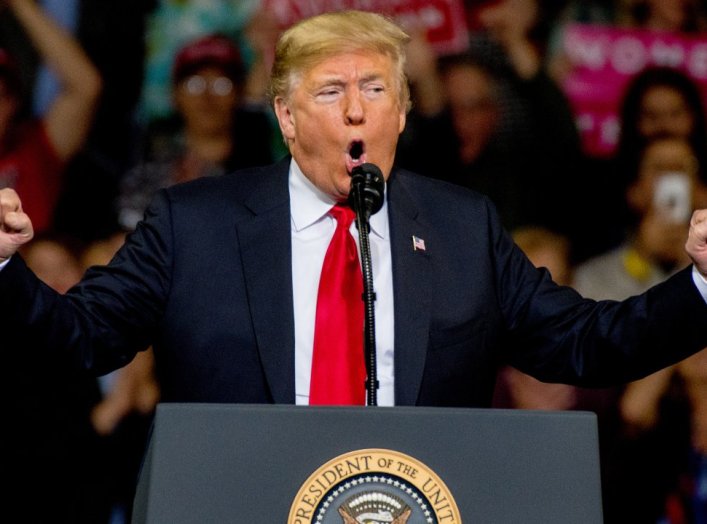Many pundits have speculated in the two years since the 2020 election that Trump would have won the election had it not been for the coronavirus.

COVID-19 and His Handling Of It? - The 2020 presidential election was particularly unique.
The coronavirus pandemic, a generational event with society-altering ramifications, was in full swing.
The virus, which would later mutate into less virile strains, was still in its most potent form. The economy was struggling. Unemployment was high. People were dying. Disagreements over how to handle the pandemic were exacerbating already stark partisan divides.
The daily lives of Americans, forced to socially distance from one another, to work remotely, to attend school remotely, to shelter-in-place, had become unrecognizable from anything familiar. And worst of all, perhaps, was the uncertainty; the road ahead was unclear; Americans didn’t know how long the pandemic would last or whether we would ever be able to “return to normal.” The media amplified the fear and uncertainty.
In all, the early days of the pandemic had an existential-type flavor.
Of course, the pandemic, which touched all aspects of American life, also affected politics. When America shut down, Donald Trump was amidst his reelection campaign; the Democrats were sorting through dozens of candidates to find their nominee.
And suddenly, the number one issue, dominating the campaign wasn’t the economy, or foreign policy, or Trump’s first four years. It was the coronavirus.
Donald Trump Wins if COVID Never Occurs?
Many pundits have speculated in the two years since the 2020 election that Trump would have won the election had it not been for the coronavirus. The general argument is two-fold. One, things were going well for Trump. The economy was strong. The MAGA base was as ardent as ever, while mainstream conservatives seemed to have made peace with Trump’s unorthodox mannerisms, given his adherence to conservative orthodoxy. So, Trump was well positioned for reelection had the coronavirus not struck.
Two, Trump’s handling of the coronavirus was perceived as negligent, meaning that on what would become the campaign’s number one issue, Trump was perceived as weak. Trump’s flippancy and callousness amplified the perception as much as his actual policy. When Biden would inherit the White House, the pandemic continued to linger, people continued to die; not much changed policy wise – aside from the new administration’s official tone, which spoke with reverence for the virus. Force Majeure events can make or break a presidential administration; coronavirus was a Force Majeure event that Trump failed to handle in a way that was politically beneficial.
A Trump campaign pollster, Tony Fabrizio, conducted a 2020 election autopsy that suggested “Trump lost the 2020 election largely because of his handling of the coronavirus pandemic.”
Fabrizio’s “27-page document shows that voters in 10 key states rated the pandemic as their top voting issue, and President Biden won higher marks on the topic,” the Washington Post reported.
FiveThirtyEight also considered whether Trump could have won reelection if not for the coronavirus.
“So, what can we ultimately say about the impact of COVID-19 on the 2020 election? Most likely, it worked against Trump. Had there been no pandemic, he may have still lost the popular vote, but considering how close the election was, he may have had a decent chance of winning the Electoral College,” Seth Masket reported. “Yet, the damage to his prospects was far from enormous, and that may have been mitigated somewhat by polarization. Indeed, a better response on Trump’s part that either helped reduce the spread of the disease or limit its economic impact could well have secured his reelection bid.”
Indeed. While it’s impossible to say whether Trump would have won the 2020 election if the pandemic had never happened, it seems reasonable to conclude that the pandemic did not help Trump’s reelection chances.
How the GOP Sold Out to Donald Trump
Donald Trump’s rise within, and subsequent takeover of, the GOP was a uniquely comprehensive political conquest.
How Donald Trump Conquered the GOP: Donald Trump’s rise within, and subsequent takeover of, the GOP was a uniquely comprehensive political conquest.
When Trump first declared his candidacy in the 2016 GOP primary, he was dismissed as a joke.
Established GOP figures, like Mitt Romney, Ted Cruz, and Paul Ryan, took one sideways glance at Trump – noted his orange skin, hanging gut, grating accent, and complete void of political experience – and discredited him out of hand.
Who did this guy think he was? Donald Trump was out of his depth in a crowded GOP field, they said; he was burning up valuable airtime and headline space from actually viable candidates – guys like Marco Rubio, poised to help the GOP compete with the Democrats for the increasingly crucial Hispanic vote, or John Kasich, a broadly appealing midwestern moderate, or even the favored upstart, the soft-spoken and cerebral Ben Carson. Besides, everyone knew it was Jeb Bush’s turn– he was next in line to inherit the presidency, after waiting patiently for the Bush succession.
So, the GOP field-at-large denounced Donald Trump, vocally, forcefully, and unequivocally – so as to signal clearly to the general population: Trump is not representative of us or our values.
The GOP Begins to Shift: Christie the Coward
The general public, on the other hand, the people who actually determine election outcomes, felt that Trump was absolutely representative of their values. The GOP, lulled to sleep through decades of complacent, predetermined power transfers, had miscalculated Trump’s appeal.
Heartland America loved him.
As Donald Trump gained traction in the primary, the criticisms that establishment figures had heaped on Trump – criticisms that seemed politically prescient at the moment – were suddenly threatening to become a political liability.
The first sign of what was coming, the trembling capitulations, was Chris Christie’s about-face. Christie, then the governor of New Jersey, was once considered a star of the GOP; he entered the GOP primaries with considerably more legitimacy than Trump. Accordingly, Christie warned voters eyeing Trump that the election was not a “game.” “We do not need reality TV in the Oval Office right now,” Christie said, “President of the United States is not a place for an entertainer.” Trump was like a “13-year-old” who “sits in his jammies in Trump Tower,” Christie said. “I just don’t think that he’s suited to be president.”
When Christie dropped out of the 2016 primary, he shocked the GOP establishment, endorsing Trump for president with a glowing review. “I am proud to be here to endorse Donald Trump for president of the United States,” Christie said. “I’m happy to be on the Trump team, and I look forward to working with him.”
Christie was a coward, clearly. But he recognized, before the GOP establishment – and well before the experts at CNN – that Donald Trump was a real-deal contender. And Christie may have sensed, intuitively, from years operating on Trump’s New York turf, that once in power, Trump would eviscerate anyone who did not fully capitulate. So, Christie entirely capitulated.
Since then, he has jumped on the Trump Train and back off.
Ted Cruz Jumps on the Trump Train
The last man standing against Donald Trump in the 2016 primary, the last establishment bulwark against a Donald Trump presidency, was Ted Cruz.
Understandably, Cruz was tactically critical of Trump. Cruz, during one memorable news conference, called Trump “utterly amoral,” a “serial philanderer,” a “pathological liar,” and “a narcissist at a level I don’t think this country’s ever seen.”
The venom with which Cruz attacked Trump was distinct – and almost certainly personally motivated; Trump had criticized first Cruz’s father and then Cruz’s wife. According to Trump, Cruz’s father was “with Lee Harvey Oswald prior to Oswald’s, you know, being shot.” Perhaps more insulting still, Trump also retweeted a picture implying that his wife, ex-model Melania, was more attractive than Cruz’s wife, Heidi.
The moment Cruz capitulated to Trump, bending a knee and kissing the ring, it was clearly over; the GOP was Trump’s. Donald Trump had called Cruz’s wife ugly; Trump had accused Cruz’s father of assisting in the greatest conspiracy in the entire 20th century. And still, Cruz – a sitting US Senator and once-GOP-kingpin – tucked his tail between his legs and pledged fealty. “After many months of careful consideration, of prayer and searching my own conscience, I have decided that on Election Day, I will vote for the Republican nominee, Donald Trump,” Cruz said in a statement released to The Texas Tribune.
Cruz then rationalized his decision. “Our country is in crisis. Hillary Clinton is manifestly unfit to be president, and her policies would harm millions of Americans. And Donald Trump is the only thing standing in her way.” Rationalizations aside, Cruz’s submission was epic – making him perhaps the political world’s biggest wuss – while ushering in the GOP’s Trump era.
Enter Lindsay Graham
Once Trump assumed control of the GOP, he demanded absolute loyalty. Rather than stand up to Donald Trump – and face existential consequences – Republican leaders mostly got in line; many with shameful, hard-to-watch-I’m-embarrassed-for-you cowardice.
Like Lindsay Graham. The former Air Force JAG officer turned Senator from South Carolina was once a vocal critic of Trump. “Any doubt left Trump is completely unhinged?” Graham once tweeted. “We should have basically kicked [Trump] out of the party,” Graham said. “The more you know about Donald Trump, the less likely you are to vote for him. The more you know about his business enterprises, the less successful he looks. The more you know about his political giving, the less Republican he looks.”
Back in 2016, Graham regularly harangued Trump, referring to the real-estate mogul as a “*******,” “kook,” “race-baiting bigot,” and “the most flawed nominee in the history of the Republican Party.” Yet, once Trump assumed the Republican nomination, Graham became one of his most loyal foot soldiers. Here’s Graham in 2017, quivering in devotion: “What concerns me about the American press is the endless, endless attempt to label [Trump] as some kind of kook not fit to be president. It’s pretty frustrating for most Republicans, quite frankly, that it's a 24/7 attack on everything [Trump] does or thinks. It gets a little old after awhile.”
Okay, Lindsay. Wow, how much has changed.
Elise Stefanik Changes Her Tune
Examples of similar behavior are easy to find. Representative Elise Stefanik criticized Trump during 2016 for his “comments about Muslims and women,” and “his signature policy positions, such as reforming NATO, building a US-Mexico border wall and having stronger cooperation with Russia.” Stefanik was very clear with respect to Trump: “I think we should expect more substance out of our candidates.”
When Trump was elected Stefanik quickly got to work revising her position. “The energy was just palpable. Anyone on the ground or who was knocking on doors, talking to voters, understood that it was going to be a historic election,” Stefanik said in reference to 2016. “The media didn’t get it. The establishment didn’t get it.” Stefanik got it, apparently. “I was proud to be a part of it. And I was proud to be on that ticket and to win by a huge, huge margin as well as President Trump's huge double-digit victory in my district.”
Rick Perry: A Donald Trump Supporter
Former Texas governor Rick Perry called Trump’s campaign a “cancer on conservatism” “that will lead the Republican Party to perdition.”
You know where I’m going with this. When Donald Trump emerged as the front-runner, Perry endorsed the carcinogenic candidate. “[Trump] is not a perfect man,” Perry told CNN. “But what I do believe is that he loves this country and he will surround himself with capable, experienced people and he will listen to them.”
Perry wasn’t just trying to save his career – he was trying to join the ticket with Trump, as the vice presidential nominee. Ultimately, Perry was named Trump’s Secretary of Energy, demonstrating that fealty could have its rewards.


